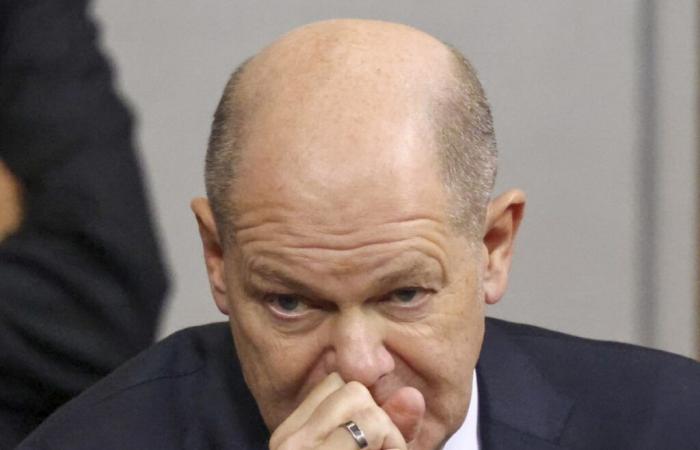Keystone-SDA
Olaf Scholz lost the vote of confidence of German MPs on Monday, closing the chapter on a mandate cut short by the implosion of his fragile government coalition. This will lead Europe’s largest economy to legislative elections on February 23.
This content was published on
December 16, 2024 – 5:47 p.m.
(Keystone-ATS) Without a parliamentary majority for more than a month, the chancellor had asked this question of confidence to the deputies of the Bundestag, with the aim of losing it and launching the official procedure for early elections.
A rare event in the political history of Germany, this procedure will make it possible to ask “voters” to decide on the “fundamental” question of the course to follow for the country grappling with a serious economic crisis, defended Monday the social democratic leader.
The result is in line with the objective: among the deputies present, 394 voted against confidence while 207 voted for, with 116 abstentions. The chancellor smiled at this announcement and turned to his vice-chancellor, the environmentalist Robert Habeck, to shake his hand.
Inventory
The leader will now ask Head of State Frank-Walter Steinmeier to dissolve the chamber, and thus allow the vote to be held on the agreed date of February 23.
In the preceding hours, the debate on this parliamentary vote had turned to an inventory of the three years spent in power by the social democratic leader.
“You had your chance, you didn’t take it,” said Friedrich Merz, head of the conservative CDU/CSU camp and favorite to replace Scholz at the head of the country.
“Worst crisis”
Economic and social issues dominated the discussions, reflecting the electoral campaign already widely underway in the country. Friedrich Merz accused Olaf Scholz of leaving the country “in one of the worst economic crises of the post-war era.”
Threatened with a second annual recession in a row, Germany is facing a challenge to its industrial model and is worried about the repercussions for its exports of the election of Donald Trump.
Scholz, champion of a social state
Olaf Scholz presented himself as the champion of a protective social state for the most vulnerable and of investment spending for the future to guarantee the prosperity of Europe’s leading economy.
On this question of investments “everything else depends, our security, our future prosperity, the competitiveness of our economy, good employment and good training, and finally social cohesion in the country,” he judged.
The issue is central in the field of defense where the country needs “massive investments” in the context of the Russian war of aggression in Ukraine.
“If there is a country in the world that can afford to invest in the future, it is us,” he insisted, stressing that Germany’s debt was around 60 % of GDP when it exceeds 100% in most other G7 countries.
Conservatives leading the polls
Disagreements over economic policy and the level of public spending had already been the cause of the fall of the tripartite government coalition. Since the dismissal of his liberal Finance Minister in November, Olaf Scholz has led a minority government between his social democratic party and the Greens, whose legislative action has been paralyzed.
Despite his chronic unpopularity, the imperturbable leader wants to believe in his chances of a second term. At this stage, the polls give him little hope and Germany is heading towards a political alternation with the conservative CDU/CSU camp led by Friedrich Merz clearly winning, with 30 to 33% of voting intentions.
The far-right Alternative for Germany (AfD) party is credited with 17 to 19.5%, but the other parties exclude any cooperation with it.
Merz’s inexperience pointed out
The SPD (social democratic party) would garner 15% to 17% of the vote, the Greens 11.5% to 14%. But the chancellor has already proven his ability to defy the odds by winning the elections in 2021, against all odds.
And he wants to renew the performance by reassuring through his experience in a tormented global geopolitical context plunged into the unknown by the election of Donald Trump to the White House.
The Social Democrats do not waste an opportunity to highlight the inexperience of Friedrich Merz, once sidelined by former Chancellor Angela Merkel (2005-2021) and who has never held a ministerial or of mayor.






